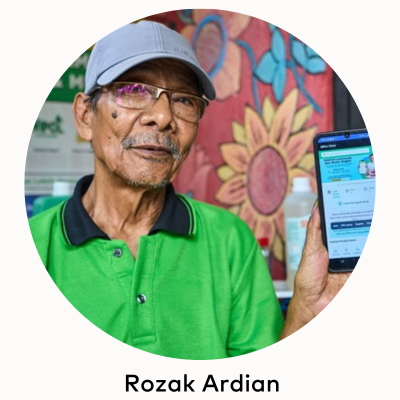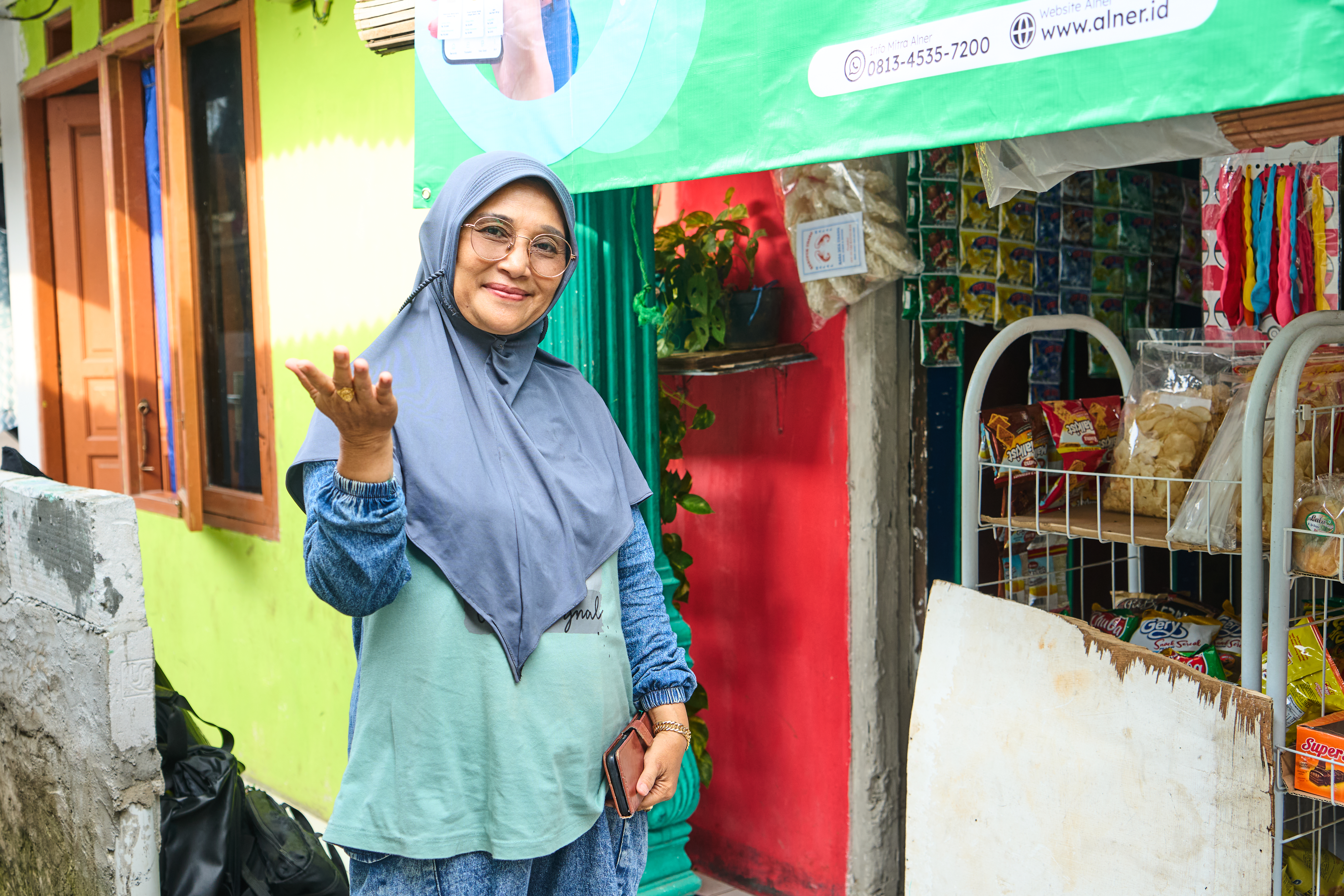This digital solution is turning waste into a small business opportunity
April 8, 2025 | By Anan Abu Rmieleh
Back in 2018, Rozak Ardian was cycling through South Jakarta when he stumbled upon a facility that collects and recycles waste. The idea struck a chord with him. Seeing the potential for positive change in his own neighborhood of Tebet, Rozak set up Melati Waste Bank.
Uncollected and improperly disposed waste is the biggest contributor to Indonesia’s plastic pollution, with 4.9 million tons mismanaged annually and rivers carrying 83% of it into the ocean. The Ciliwung River, which runs behind Rozak’s family’s house, is one of the most polluted rivers in the world. Over 70,000 settlements rely on it for clean water, despite plastic waste causing flooding and other hazards, including health issues.

For years, Melati Waste Bank collected waste from households and sold it to recyclers, generating a modest income of 1.5 million rupiah ($92) per month. But things changed when Alner, a digital platform that offers products with returnable packaging, entered the picture.
Rozak and his team — eight dedicated neighbors, mostly women — added a new revenue stream: selling Alner’s products, everyday household goods, from food to detergent. Instead of being available in single-use plastics, they are instead packaged in returnable containers, making them both affordable and a way to reduce waste. The startup offers a deposit and reward program to incentivize consumers to return empty packages so they can be refilled and sold again. By introducing these new products, Rozak has expanded his customer base, turning neighbors from waste contributors into loyal customers and participants in a more circular economy.
Today, nearly half of Melati’s 68 regular waste contributors are also customers, buying these products at a lower cost. An additional income of 400,000 Rupiah ($24) per month may seem small, but for Rozak, it has made a real difference. Last year, the $183 profits from Alner’s products allowed him to take his family on a rare vacation to Puncak, a lush, green retreat outside the city.
“Before, we only sold waste. Now we sell products,” Rozak says with a proud smile. “It’s a small change, but it means a lot.”
The impact of Alner’s work is twofold. More waste is being returned and repurposed instead of ending up in rivers, and more small businesses are making extra income without having to significantly change their operations. Community waste banks are evolving into micro-retailers, and small local stores are transforming into community hubs that contribute to a healthier environment.
That’s why Alner earned a Mastercard Strive Innovation Fund grant, which recognizes early-stage solutions with the potential to drive outsized impact for small businesses. Alner used the grant to enhance its app, which has been a game-changer for hundreds of small businesses like Melati. Previously, orders were placed manually through WhatsApp, but now, everything is digitized through the app. It helps Rozak track inventory, manage returns, and unlock real-time deals.
“The app has cut down manual work and reduced errors," says Bintang Ekanada, Alner's co-founder and CEO. "This kind of digital upgrade wouldn’t have been possible without Mastercard Strive’s support, "
Since 2023, Alner has reached over 1,000 micro-retailers in Jakarta, with more than 200 consistently using the app to source refillable products. Alner has been supporting its small business clients with training, personalized support, peer-to-peer learning, webinars and gamified features, where retailers can compete for better discounts and rewards. These incentives have led to a 20% increase in app engagement and a 10% rise in packaging returns.
Meanwhile, in Cipete Selatan of Jakarta, another small business is thriving with Alner’s support. For 15 years, Nur Syamsiah has been selling snacks and everyday essentials at a warung – the small, family-owned shops that are the backbone of Indonesia’s local economies.
Nur’s store is a small space nestled within the heart of her home, connecting the kitchen and living room to the narrow alleyway outside. Brightly colored candy wrappers and snack packages hang from the front of the house, catching the eyes of passersby. Children’s laughter rings out as they chase each other down the alley, while neighbors sit casually at their doorways. The scene is humble yet full of life — a blend of home, business, and the resilient spirit of a community that thrives despite its challenges.

Nur Syamsiah is one of millions of warung operators, the neighborhood shops that are the backbone of Indonesia’s local economies. She sources products from Alner at lower prices and encourages her customers to return used packaging, which goes back into Alner's supply chain.
Like Rozak’s waste bank, Nur’s store is now part of the circular economy. Through Alner, she sources products at lower prices while also encouraging her customers to return used packaging. This means that instead of just selling products, she’s also helping collect waste that goes back into Alner’s supply chain, making her shop an unofficial waste collection point.
Her store, open from 5 a.m. to 10 p.m., hadn’t changed much over the years. But now, thanks to Alner, it has become a new force for sustainability. Digitalization has been particularly impactful — she can look up offers on the Alner app and share them with neighbors and friends through WhatsApp groups. And the more containers she returns, the more offers and discounts she can get from Alner.
Nur’s store now earns around 2 million Rupiah ($122) a month in revenue.
“I hope I can get finance that enables me to increase the variety of products in my store,” she says. “I’m not the only store in the neighborhood, and to remain competitive, I need to add new products and maybe bring more unique products to the shop, which will require extra capital I don’t have now.”
To tackle this key challenge for Nur — and similar small businesses across Indonesia — Alner is exploring ways to enable them to access credit through its app, a potential new feature that could boost micro-retailers' purchasing power and fuel their growth.
Alner gets significant discounts from fast-moving consumer goods manufacturers by opening up new markets for sustainable products. Part of these discounts is passed on to small retailers like Rozak and Nur, giving them a competitive edge while encouraging waste reduction.
Alner plans to expand its footprint to Bali and Surabaya in 2025, with onboarding already underway. Its goal is to onboard 1,000 additional micro-retailers by year-end. To achieve this, Alner is introducing new product categories, as market insights show that a wider variety of products leads to higher revenue for micro-retailers.
If more wholesalers in Indonesia adopted Alner’s approach, the country’s waste problem could be drastically reduced. Mastercard Strive was drawn to Alner because its model encourages other players in the supply chain to rethink how they operate, says Natasha Jamal, vice president of the Mastercard’s Center for Inclusive Growth, which launched the Innovation Fund in 2022.
What if every wholesaler adopted a returnable packaging system? What if warung stores across the country became part of a nationwide waste collection network?
“The potential for impact is enormous,” Jamal says. “For now, though, the transformation is happening one small business at a time. And that’s how real change begins.”
Anan Abu Rmieleh is the head of program communications for Caribou, a Mastercard partner that helps manage the Mastercard Strive small business program.
Photos courtesy of Caribou.